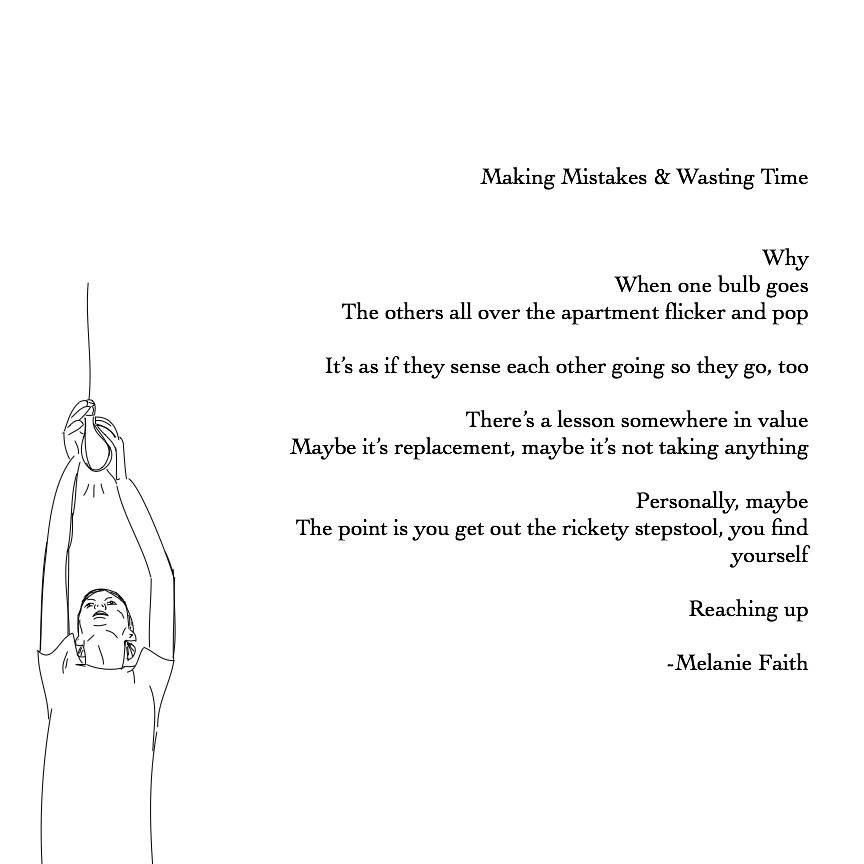Super excited to have this article published at Women on Writing today!
“5 Line Breaks to Inspire Your Poetry Writing”
By: Melanie Faith
I’ve been a practicing poet since I was 17. When I think back to the many styles of poetry I joyously tried in college and grad school and beyond, I marvel at how much my line breaks have changed and continue to evolve as I grow as a writer and with the needs of each successive project.
My first poems, handwritten on pale blue lined paper that I spent my weekly allowance to purchase at the local stationery store, had looping scrolls of lines across the pages, almost from margin to margin. By graduate school, while experimenting with haiku and tanka, the sparer I could make my lines the better. (I’m not a sparse-speaking person—surprise, surprise—so it was often a challenge.) Since then, my lines usually rest in the merry middle somewhere between languid, Whitmanesque flourishes and ultra-succinct compression.
Let’s take a closer look at line breaks and what they can mean to your own writing practice.
The Innate Break: This is what I call a line break that just feels right while drafting. Why’d you break the line there? You don’t know, and you’re not stopping to think about it right now. Your hand keeps the pen rolling or your fingertips typing while you focus solely on the words unspooling. You break the lines intuitively and only notice them later, when editing or writing another draft. There’s something to be said for letting the poem take the form it wants to take. A little like after learning to ride a bike—for the first draft or two it’s often not necessary to think consciously, “Should I break the line on this word or that one?”, just like you don’t think, “Right foot, make sure to pedal now. Okay, left foot, same deal. Pedal now.” There’s synchronous motion that happens in cycling and in drafting a poem. Letting that sensory flow go can lead our work to some great destinations.
The Emphasis Break: Words that fall at the beginnings and endings of lines get extra emphasis for the eye and for the mind. End lines on thematic or precise word or phrase to emphasize key ideas. You can also take a poem that had innate breaks and, in the editing stage, make new line breaks on more precise images or diction choices.
The Stanza Starter or Ender: Just like the opening and closing words in each line get a little extra attention from the reader, so do images or words that open and close a stanza. The stanza breaks, in fact, get even more emphasis due to white space. Whether while drafting or later editing our poetry, it can be a good idea to consider if the line you are breaking a stanza on is the best place to emphasize the poem’s theme or content. If not, consider breaking the stanza-breaking line at a new place.
The Form-Based Line Break: If you write poetry that has a set pattern or formal structure—such as a sonnet, villanelle, or terza rima—your line break will be based on a number of fun constraints, such as stressed and unstressed syllables, syllable count, and rhyme scheme. I have great respect for poets who find the constraints of pattern poetry motivating, although my poetic brain runs more to making my own line-break patterns. Neither style is inherently better or worse than another—they are both apt vessels for the poems you write. If you know that writing formal poems is your jam, I encourage you to try a few kinds of poems to experiment with the different end-line conventions each requires. If you usually write acrostics, try haiku. If you often write odes or limericks, try an Italian sonnet. If your last few poems were villanelles, try writing a sestina or a ballade. There’s great variety in line breaks among formal verse that a poet could spend many years happily exploring.
The Variety Approach: Are you working on a chapbook or a poetry collection? Are you preparing a handful of poems (often three to five) to submit to a literary journal? In this case, it might be good to read the poems in relation to each other. Is there some variety in where and how you break your lines? Is each line separated at an optimal place and/or have you left some blank space somewhere on the page? Also, sometimes placing poems with long lines next to poems with few lines and/or succinct lines can create a meaningful pattern for the reader and also inform any editing or new line breaks. You might also consider shuffling the order of your poems.
Use these line-break ideas as you draft, edit, or prepare submissions of your poetry. There’s no 100% right or wrong place to end a line and begin a new one, but with time, practice, and focus, and having these ideas in your pocket, you may well be surprised how quickly you up your poetry game.
Want to learn more? Check out my online poetry class that starts April 21st! Jump-Start Your Poetry Practice.✍️










